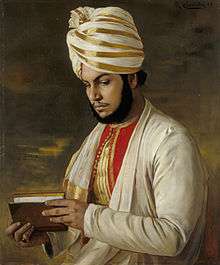Munshi
Munshi (Urdu: مُنشی; Hindi: मुंशी; Bengali: মুন্সী) is a Persian word, originally used for a contractor, writer, or secretary, and later used in the Mughal Empire and British India for native language teachers, teachers of various subjects, especially administrative principles, religious texts, science, and philosophy and were also secretaries and translators employed by Europeans.[1]

| Munshi | |
|---|---|
| Country | Indian subcontinent |
| Branch | contractor |
Etymology
Munshi (Persian: منشی) is a Persian word used as a respected title for persons who achieved mastery over languages, especially in British India. It became a surname to those people whose ancestors had received this title and some of whom also served as ministers and administrators in the kingdoms of various Royals and are regarded as nobility. In modern Persian, this word is also used to address administrators, head of departments.
Use by British
Administrators, head of departments, accountants, and secretaries hired by the government in British India were known as Munshies. The family name Munshi was adopted by families whose ancestors were honoured with this title and were responsible for administering various offices etc. and these families (selective) were and are regarded as nobility. Abdul Karim, known as "The Munshi", was a valued and respected Indian attendant or aide-de-camp of Queen Victoria.[2]
See also
- Abdullah bin Abdul Kadir
- Kanhaiyalal Maneklal Munshi
- Munshi Abdur Rouf
- Munshi Hakimuddin
- Premchand
References
- Chisholm, Hugh, ed. (1911). . Encyclopædia Britannica. 19 (11th ed.). Cambridge University Press.
- Visram, Rozina (2004). "Karim, Abdul (1862/3–1909)". Oxford Dictionary of National Biography. Oxford University Press. doi:10.1093/ref:odnb/42022. (subscription required) for full access
| Look up munshi in Wiktionary, the free dictionary. |